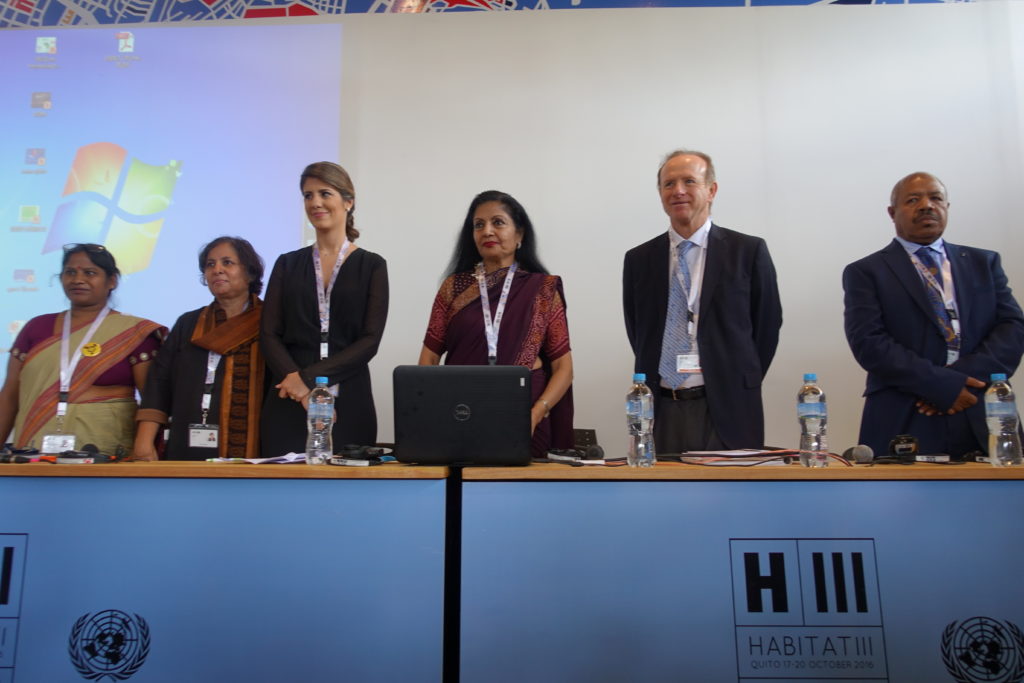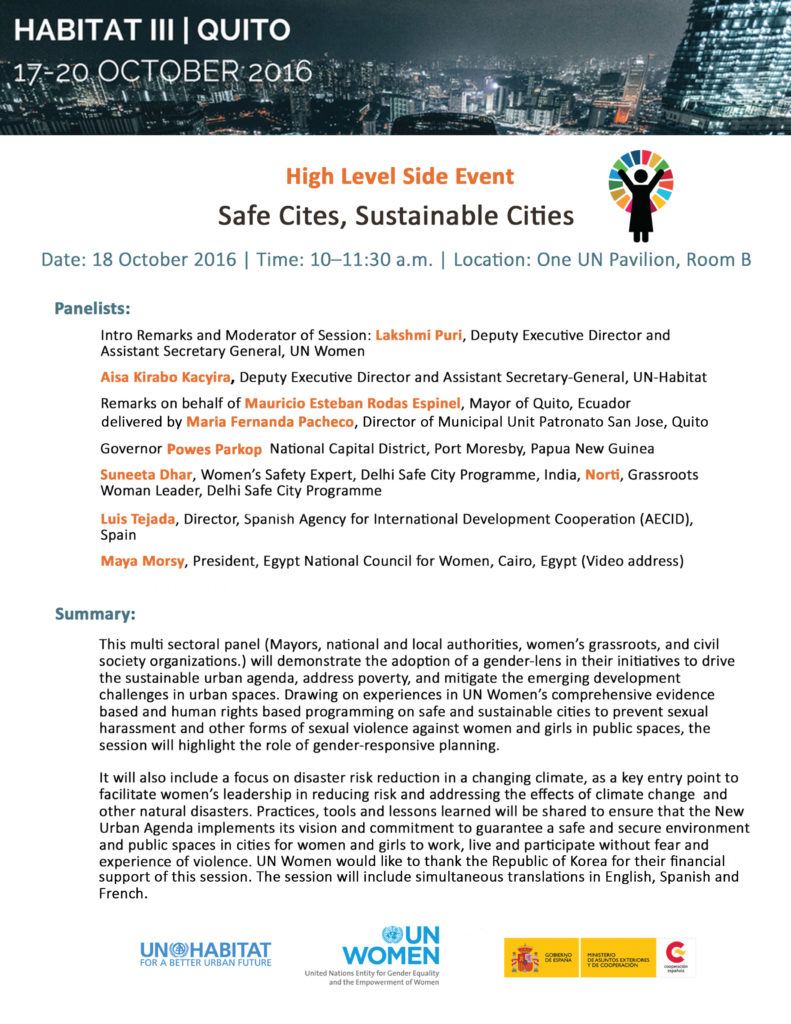
Hello from day 4 at HABITAT 3 in Quito, Ecuador. The big event for me today was the UN Women panel on their Safe Cities programme.
UN Women could only host one high-level session at the conference and they chose this issue. My colleagues at UN Women have advocated for several years for this program on sexual harassment in public spaces to be recognized and included in these kinds of high level global events, so this was a big payoff.
The room was packed with about 150 people, including people standing in the back and sitting on the floor. It went really well.
First, here is an overview of what the Safe Cities programme is. This is essentially what was shared by the moderator, Lakshmi Puri, Deputy Executive Director and Assistant Secretary General of UN Women.

While the program is now in more than 20 cities, there were five flagship cities (Delhi, Cairo, Quito, Port Moresby, and Kigali) that started in 2011. Representatives from all five cities were invited to speak on the panel and representatives from Port Moresby, Delhi and Cairo were able to join (the rep from Cairo gave a pre-recorded video address). They spoke about their efforts and progress over the past five years. They were all incredibly inspiring, but I think that the governor from Port Moresby was my favorite.
In his opening remarks, Governor Parkop Powes did not shy away from sharing the problem of violence in Papua New Guinea. He talked about how tribes have been at war with each other for a long time and that violence is often seen as a means for solving problems. He noted that they are a patriarchal society where men are dominant. “Trying to change the violent culture is not easy. But we see it’s important. Violence is an impediment to women and also to the development of our city.”
The focus of the Port Moresby Safe Cities program has been to make marketplaces safer as they are not only economic hubs but also social hubs. They’ve had some successes so far, but they have a ways to go, he said.
“After being in the program for a while, we see that the interventions deal with the symptoms of violence and they alone won’t solve the problem. We’ve created a safe market to make it safe for women and girls, but we haven’t solved the problem of who is responsible for violence. The women vendors who leave the market and go back home still face threats of violence and fear of violence as they travel or even in their home. So we haven’t solved the problem of violence. Having a safe house for women facing domestic violence is symptom but doesn’t solve the problem. Same thing with the women-only buses – we’d rather have an integrated system where everyone is safe, but for now, we decided to have a women-only bus. Ultimately, it’s the behavior of men that’s the problem. They are violent. It’s the culture. We are working with UN Women to create behavior change.”
They are trying some creative methods. For example, doing yoga with men to help them start to respect themselves and then respect women. As another example, Governor Powes takes a walk every Sunday that anyone can join him in. He said sometimes a thousand people will join him, most of them women. This is really revolutionary because many women feel very unsafe walking in public. Rates of rape are very high, as are rates of murder. On average, every single person knows at least one person who has been murdered. So by walking in public for recreation, the women are claiming public spaces and demanding that they be safe for all.
A representative from the Spanish Agency for International Development Cooperation closed out the panel. This is the “mother donor” of the program. They continued to fund it, even when Spain was in an economic crisis. The representative shared that they will increase their support next year. This is huge as it is really hard to fund programs to end violence against women (as I know firsthand from my limited experience trying to fundraise for Stop Street Harassment). Having this support is really important and makes the program possible.
Later in the day, I also had the opportunity to join my boss in meeting with the Quito Safe Cities team. They talked about their work with transit officials to make public transit safer. They also have created a comic book about respect that they will be taking to five schools and training teachers on how to hold conversations around respect. They were very open about how Ecuadorian culture is full of machismo and how they have to focus on changing mindsets and attitudes before they can really see change. But they said they have support at the highest levels — and indeed, the wife of the mayor, Maria Fernando Pacheco, led the meeting as she is very supportive of the program — and so that is making their implementation process easier. Plus, they have alarming data that helps them more easily galvanize support: more than 90% of women face street harassment. More than 1 in 4 girls have been harassed outside their schools. Most women see public transit as unsafe. And most women try not to be alone in public after 6 p.m. when it gets dark.
These two events were inspiring and uplifting and it made me so so so so happy to hear from and meet people in various parts of the world who are committed to making public spaces safer and who understand that ultimately, we have to see cultures change before that will be a reality.
